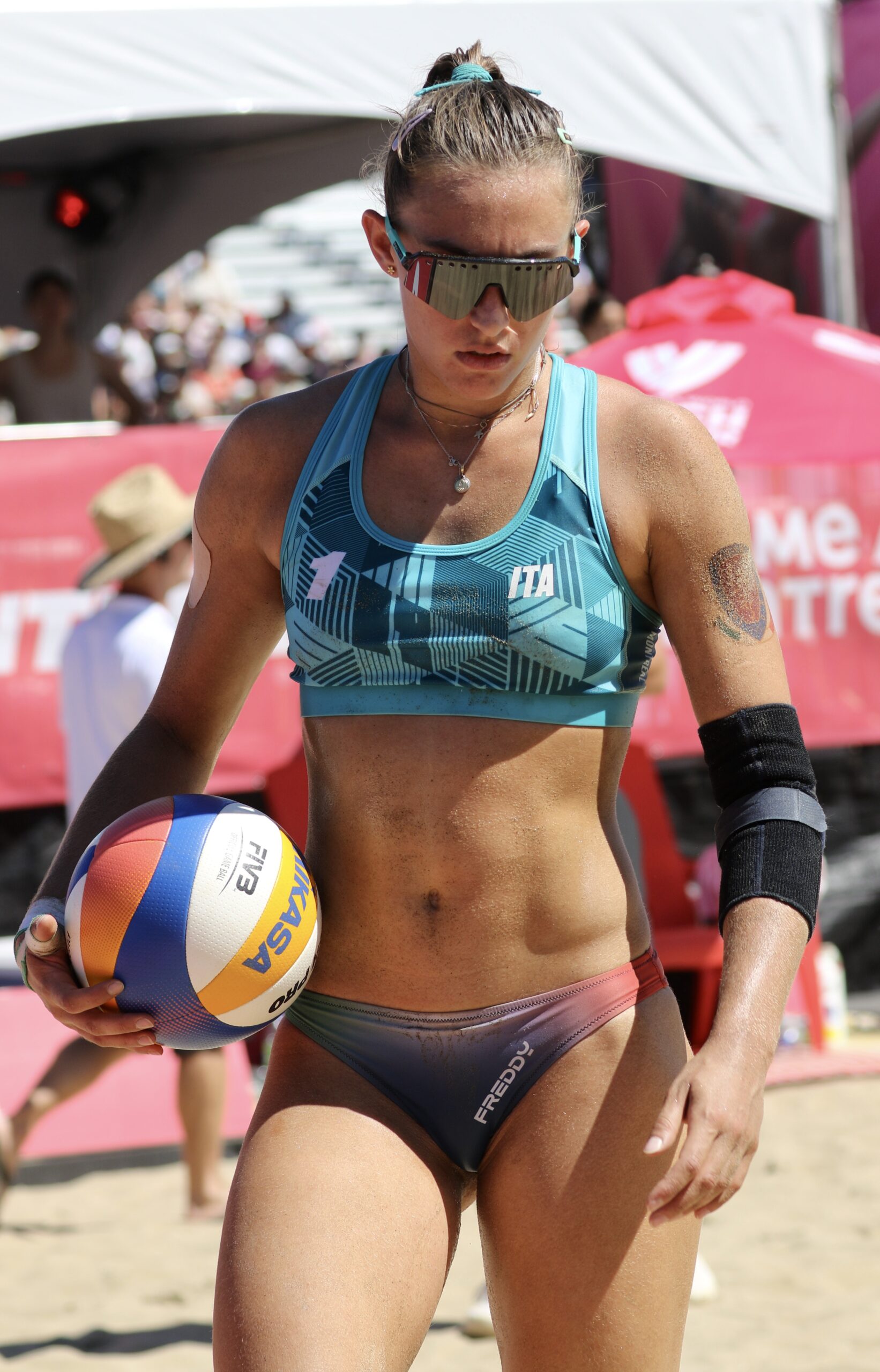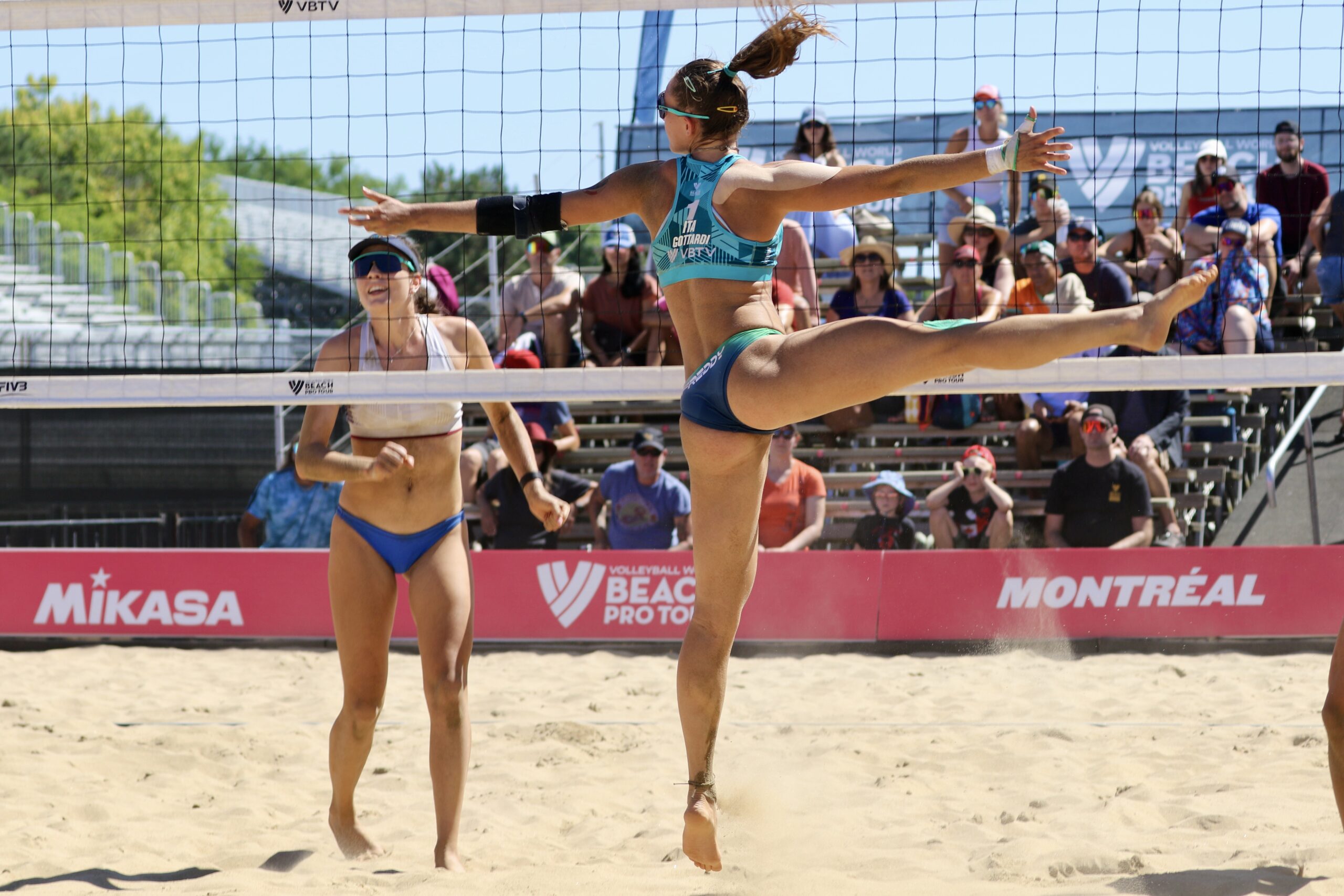MONTREAL, CANADA — Nothing within a sizable blast zone is safe when Valentina Gottardi pulls her arm back for a spike. Not even her sunglasses. During a pool match in the Montreal Elite 16 event, in the midst of a rare frustrating week for Italy’s top team of Gottardi and Reka Orsi Toth, Gottardi took out her frustrations on a swing against Australia. The ball caromed off the sand and nearly cleared the side court’s stands. She followed through with such force that her sunglasses ended up atop her head, like some wayward satellite trying to escape orbit.
The spike earned Italy a point. The roar from the crowd and Gottardi’s slightly sheepish grin made a point about the Italian star. Center court or side court, she lives for center stage.
“I notice everything when I’m inside the court,” Gottardi said. “Some players say that they don’t feel anything, they are so focused on the game. It’s not like this for me, because yes, I’m really focused on the game, but at the same time, I love when the crowd is present and I can feel them. Even if it’s for the other team, I can convince myself that it’s for me.
“And I try to play better because of them—because I want to give them an experience and give them something they will remember.”
She needn’t worry. Few who watch her play are likely to forget the experience. Still just 22 years old as she settles into a new partnership with Orsi Toth, Gottardi is one of the sport’s best young players—and “young” may be an unnecessary qualifier. She is also one of any sport’s most distinctive players. Relentless, with a high jumper’s vertical and the body control of the dancer and gymnast she once was, she’s worth the price of admission.
For many athletes, the Olympics are the pinnacle of a career. For Gottardi, playing under the Eiffel Tower last summer was just the opening act. She made it to Paris while much of the world was still wrapping its mind around how good she could be — while she was, too, for that matter. It’s why she plays the way she does, every no-look flick, headlong plunge, and hammered spike an exploration of what’s possible and an expression of who she is. She’s Valentina Gottardi. Never more so than when her feet touch the sand.
“I feel myself on the court,” Gottardi said. “And sometimes I don’t feel myself outside, so when I play, I want to transmit what I feel and what I really am.”

Valentina Gottardi and Reka Orsi Toth in between points at the Montreal Elite/Graham Hays photo
Auditioning for the Role
Gottardi understood the sand as a stage even before she was a beach volleyball player — at least before she was officially a full-time beach player. Primarily an indoor player who had previously played in the sand only sparingly, she signed up for one of the only tournaments taking place amid COVID restrictions in Italy. She had been to a youth national team training camp months earlier but wanted to make an impression on the coaches attending the tournament. She set her alarm even earlier than usual so she could be in the right place to do her activation exercises where she knew the national team coaches would see her. When those coaches warmed up the athletes on court, she set out to spike the ball as hard and jump as high as she possibly could.
When the tournament was over, she returned to Cervia, the seaside town not far from her hometown of Modena and where her family goes in the summer. Stepping into the shower, she nearly missed the call from the unknown number. It was one of the youth national team coaches, wanting to know if she would consider moving to Formia to train and focus exclusively on beach volleyball. Apparently, she had made an impression.
Some people might hesitate in that moment, unexpectedly confronted with a rather substantial life decision, surrounded by nothing more useful than shampoo and loofahs. Instinctual on the court, Gottardi proved no less willing to go with her gut in this moment. Barely pausing, she said yes. It meant a difficult conversation with the indoor team in Modena that was expecting her on the court that season, but it was an easy answer.
“It came out of my mouth, and I didn’t think,” Gottardi said. “But I think I probably said this because I have more fun playing beach volleyball. I want to be one of the main characters, one of main protagonists in my games. I can do that in indoor, yes, but it’s a bigger team and sometimes you don’t play because they need another player with different characteristics against an opponent. And I’m not willing to do that. I want to play every single game, I want to touch the ball every time it’s in the air.”
She’s laughing as she gets to the last line, self-aware about the slightly Type-A tendencies familiar even in team sports to the likes of pitchers, point guards and quarterbacks. And she was willing to do the work to earn all those touches. She craved the work, in fact. Beach also appealed because of the training environment, because she would be part of the national team set-up and able to push herself in ways impossible in a club setting.
“It was mainly spiking, serving and spiking, I didn’t do anything else in indoor volleyball,” Gottardi said. “So it was a whole new world in beach volleyball. I had to do everything. I had to learn everything. And I didn’t know how to do most of these things. But I love learning. I love improving. I love a challenge.”
Which proved to be a good thing when, scarcely a year into life as a full-time beach volleyball player, she was approached about playing with Marta Menegatti, by that time already a three-time Olympian and European champion.
Again, she didn’t hesitate to agree, more intrigued than intimidated by pairing her inexperience with Menegatti’s Olympic resume. They promptly won the Italian Championship. Within a year, they had multiple Beach Pro Tour podiums. Within two years, their first Beach Pro Tour title at the 2023 Saquarema Challenge. And last year, a semifinal run in the World Championships, the Olympics in Paris and silver medals in the European Championships in The Hague. All because she trusted that being herself would be enough, even alongside a legend.
“If something is coming towards you,” Gottardi said of the initial invitation to play with Menegatti, “You need to catch it to make it yours.”

Valentina Gottardi at the Montreal Elite/Graham Hays photo
Uniquely Herself
It helps when what is yours doesn’t look like anyone else’s. Coming to beach volleyball, Gottardi lacked the experience of some of her counterparts, even some her own age. But they didn’t have her unique physical profile, the impressive vertical leap, lateral quickness and body control. Frozen in a moment in photos, she often looks like a dancer or a gymnast in the middle of a pirouette or vault. Growing up, she was both. She credits those experiences for both the obvious athletic payoff and her work ethic. But she doesn’t miss those mediums. Scripts never suited her.
“It was just about performance — you need to do that movement in that exact way,” Gottardi said. “And I prefer to find my way.”
Her creative independence makes her more than just a promising young talent, more than merely someone with the potential to do a lot of winning. We’ve seen people like that. They’re worth watching, too. But they’re not throwing up a back set from the end line at full sprint, running through an advertising board on an elevated court, flicking a ball backward over her head — against Ana Patricia, no less, or countless other Gottardi-isms.
More and more, efficiency and cost-benefit analysis rule sporting strategy as much as corporate planning. That’s fine if you consider competition as industrial — committed to a goal of producing the most wins at the lowest cost (and if your livelihood depends on those wins, it’s difficult to criticize the mindset). But it’s certainly arguable, and was closer to conventional wisdom once upon a time, that sports are at least as much stage as factory.
Asked if there is someone from sports, art or music whom she admired for their creativity, Gottardi immediately settles on an example close at hand, Norway’s Anders Mol.
“Mol does everything he wants,” Gottardi said. “He tries different things, even though he is the most athletic one, sometimes he does things like a jumbo, a rainbow or a backhand flip — different things. He doesn’t need to do them to win the match, but he still does that. Why? Because he expresses himself in this way, and I want to do the same thing.”
It’s a telling choice in another way. Mol isn’t just subjectively artistically brilliant. He’s empirically competitively excellent. Gottardi doesn’t care more about putting on a show than winning. She just doesn’t believe the two are mutually exclusive.
Limiting mistakes and picking her moments? Yes, yes, she’s heard it all from her coaches. She understands that’s part of evolving and growing as a player. At the same time, being herself has always been her greatest asset. And the more she explores what’s possible on the court, the more she tests her own limits of athleticism and creativity, the more she expresses herself. And the better she becomes. She’s not AI, synthesizing everything that has come before. She’s creating something out of what was previously nothing.
“If I spike as hard as I can, of course sometimes there are mistakes. It’s normal. If I do a strange thing, sometimes it goes well. Other times, no, it doesn’t. OK, it happens,” Gottardi said. “I think that it is part of me. Yes, I make mistakes, but it’s because I love scoring, so I try to score in different ways and try new things, different things that are not the common ones. I try to find my way. I don’t want to follow the stereotypes and the normal way.”
The Artist’s Studio
There is a beach in Formia, near where Gottardi spends much of her time in residence with the national team, but she notes almost wistfully that she almost never goes there. There is never time. If she’s not training, she’s studying or staying connected from a distance with family, friends and her boyfriend, Sam Cottafava, Italy’s top male defender and 2024 Olympian. Life is good — traveling the world was another appealing aspect of playing beach volleyball in the first place. But life is also complicated. And busy.
Off the court, she tries to be what people need her to be, do what’s expected of her. She tries to play the role in which she’s cast to the best of her ability.
But on the court? That’s when you see Valentina Gottardi. And when you do, you won’t soon forget the experience.
“I can express myself — I can scream and I can yell and I can jump and I can do everything I want without being judged,” Gottardi said. “Or even better, they judge me, but in a good way because they think I’m good at it and I’m athletic and everything. So I like it better when I’m on a court and when I play.”

Valentina being…Valentina/Graham Hays photo

